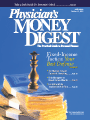Publication
Article
Physician's Money Digest
Dividend Debate Comes to the Forefront
Author(s):
Nineteenth-century oil magnateJohn D. Rockefeller once remarked,"Do you know the onlything that gives me pleasure? It's to see mydividends coming in." Not coincidentally,Rockefeller was reportedly the richest manin the world when he retired.
Due to 2003 tax law changes, whichdropped the maximum tax rate on quali-fied dividends to 15%, dividends arereturning to the forefront of investorinterest. Two decades ago, dividends werefar more popular: 469 companies in theS&P 500 paid dividends on their commonstock in 1980. Today there are about 360S&P 500 companies making the payouts.
Over the course of history, dividendshave played a major role in total portfolioappreciation. Between 1926 and2003, dividend distributions accountedfor 42% of the S&P 500 total return—that's nearly half of the S&P 500's 10%average annual return.
On the One Hand
The new tax rate on qualified dividendstook effect in 2003. Under the previous taxlaw, dividends were taxed at ordinaryincome tax rates. If the current law isallowed to expire, dividends will again betaxed as ordinary income in 2009.
Does this mean that you should shiftyour portfolio to dividend-paying stocks?As usual, it depends on your personal situation,but the favorable tax treatment isan important factor to consider.
The new tax treatment of dividends hascreated an incentive for investors to owndividend-paying companies outside of tax-deferredaccounts. Dividends paid onstocks owned within an employer-sponsoredretirement plan or a traditional IRAwill be taxed as ordinary income whenthey are withdrawn in retirement. Individualswho want to take advantage ofthe new tax law may want to considerholding dividend-paying stocks in taxableaccounts because today's dividend tax rateis almost certain to be lower than tomorrow'sincome tax rates.
But on the Other
Even though dividends are more tangiblethan earnings, they still have their critics.Cash paid out to shareholders depletescorporate wealth. By giving money toshareholders, the corporation may be sayingthat it doesn't believe reinvesting inthe company is a better use of its cash. Ascorporations are slowly emerging from arecession, many may need all their cash tomake some important capital expendituresthat were postponed. But there isincreasing pressure to pay dividends.
Some experts point out that corporatecash belongs to shareholders, whether it'spaid out as dividends or reinvested toincrease the company's asset value. Themore that goes out in cash, the less can beexpected in the form of capital appreciation.Cash dividends create a taxable event.When a company declares a dividend,shareholders must pay taxes based on thecompany's timing rather than their own.Even investors who want to reinvest theirdividends must pay taxes on them first.
Some investors own companies thatpay dividends precisely because theywant income. But those who don't wantthe immediate tax liability prefer to owncompanies that pay stock dividends, asopposed to cash dividends, becausethere's no taxable event until shares aresold. This allows investors to defer taxesfor as long as they desire.
Scott J. Kleiman is an independentadvisor with Linsco/Private Ledger,located in Elkins Park, Pa. All securitiesoffered through Linsco/Private Ledger, member SIPC. Pastperformance is no guarantee of futureresults. The information presented is the opinionof Scott Kleiman and not that of Linsco/PrivateLedger. He welcomes questions or comments at800-242-1760 or scott.kleiman@lpl.com.
